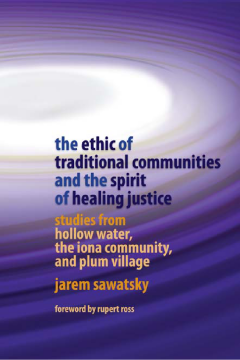
BOOK
The Ethic of Traditional Communities and the Spirit of Healing Justice
(2009)
Additional Information
Book Details
Abstract
What is healing justice? Who practices it? What does it look like? In this groundbreaking international comparative study on healing justice, Jarem Sawatsky examines traditional communities including Hollow Water - an Aboriginal and Métis community in Canada renowned for their holistic healing work in the face of 80 per cent sexual abuse rates; the Iona Community - a dispersed Christian ecumenical community in Scotland known for their work towards peace, healing and social justice, rebuilding of community and the renewal of worship; and Plum Village - a Vietnamese initiated Buddhist community in southern France, and home to Nobel Peace Prize nominated author, Thich Nhat Hanh.
These case studies record a search for the kind of social, structural, and spiritual relationships necessary to sustain a healing view of justice. Through comparing cases, Sawatsky identifies the common patterns, themes, and imagination which these communities share. These commonalities among those that practice healing justice are then examined for their implications for wider society, particularly for restorative justice and criminal justice.
This innovative book is accessible to those new to the topic, while at the same time being beneficial to experienced researchers, and will appeal internationally to practitioners, students, and anyone interested in restorative justice, law, peace building, and religious studies.
I want to congratulate Jarem for the way he has written this book. He has freed himself (and his readers!) from the professional jargon that so often characterizes research of this kind... This is not the work of a cheerleader for "justice-as-healing" but the informed reflections of a deeply curious human being who wonders if there might be better ways for all of us to behave towards each other. At the same time, he is not in the least hesitant to express misgivings or pose unanswered questions as he goes. Like all tales of penetrating explorations, this book leaves the reader more deeply intrigued and curious at the end than they were at the beginning.
Extract from the Foreword by Rupert Ross, Assistant Crown Attorney for the District of Kenora since 1985, and author of Dancing with a Ghost: Exploring Indian Reality, and Returning to the Teachings: Exploring Aboriginal Justice.
The Ethic of Traditional Communities and the Spirit of Healing Justice has its origins in Sawatsky's doctoral dissertation but has been rewritten in an accessible form.
Political Studies
Jarem Sawatsky is Assistant Professor of Peace and Conflict Transformation Studies at Canadian Mennonite University in Winnipeg, Manitoba where he teaches and practices the art of peacebuilding. Jarem is a practitioner, a scholar, and activist of restorative and peaceful ways of engaging harms and cultivating healing justice. He has written numerous articles on peace, conflict, and restorative justice. Find out more at www.jaremsawatsky.com.
Well worth the read...none of this is airy-fairy, but rooted wisdom. The kind we need.
The Church Times
Table of Contents
| Section Title | Page | Action | Price |
|---|---|---|---|
| 1. Introduction | |||
| Part 1 | |||
| 2. Cultural values and change | |||
| 3. Development and change | |||
| 4. Implications for facilitators of the links between cultural values and change | |||
| 5. Culturally attuned change facilitation | |||
| 6. Principles for change facilitation across cultures | |||
| Part 2 | |||
| 7. Strategies for change facilitation across cultures | |||
| 8. Selection of methods | |||
| 9. Culturally attuned change facilitation methods | |||
| 10. Contemporary facilitation methods through a cultural values lens | |||
| 11. Cross-cultural conflict management methods | |||
| 12. Evaluating change across cultures | |||
| 13. Conclusion | |||
| Annex: Facilitation questions to consider through a cultural lens around a program cycle |
